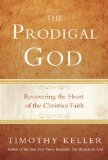I recently picked up Tim Keller’s new discipleship DVD Gospel in Life: Grace Changes Everything (Zondervan) [watch the trailer here]. It looks excellent, and I was struck by his description of the Prodigal Son parable and the 3 ways to live.
Here is a brief summary of his 3 ways to live:
- Religion: I obey, therefore I am accepted by God.
- Irreligion: I don’t need to obey anyone but myself.
- Gospel: I am accepted by God at an infinite cost to Jesus Christ, therefore I obey.
I also stumbled across a brief online article adapted from Keller’s teaching on how the Gospel is the key to change. I thought I’d share an excerpt on how the Gospel counters this religious way to be your own savior. It’s the Gospel vs. Moralism.
Jesus lived the life we should live. He also paid the penalty we owe for the rebellious life we do live. He did this in our place (Isaiah 53:4-10; 2 Cor 5:21; Mark 10:45). We are not reconciled to God through our efforts and record, as in all ther religions, but through his efforts and record. Christians who trust in Christ for their acceptance with God, rather than in their own moral character, commitment, or erformance, are simul iustus et peccator (Latin) – simultaneously sinful yet accepted. We are more flawed and sinful than we ever dared believe, yet we are more loved and accepted than we ever dared hope at the same time.
Without this unique understanding of grace-salvation, religions have to paint God as either a demanding, holy God who is placated by back-breaking moral effort, or as what C.S. Lewis calls “˜a senile, old benevolence’ who tolerates everyone no matter how they live. The problem is that if I think I have a relationship with God because I am living morally according to his standards, it do s not move me to the depths to think of my salvation. I earned it. There is no joy, amazement, or tears. I am not galvanized and transformed from the inside. On the other hand, if I think I have a relationship with God because the Divine just embraces us all, no matter what how we live”” that also does not move me to the depths. I simply have the attitude of Voltaire, who, on his deathbed famously said, “Of course God forgives””that’s his job.” Any effort to take away the idea of Christ’s substitutionary atonement and replace it with a moralism (i.e., being moral, working for others, imitating Jesus) robs the gospel of its power to change us from the inside out.
The gospel is, therefore, radically different from religion. Religion operates on the principle: “I obey, therefore I am accepted” . The gospel operates on the principle: “I am accepted through Christ, therefore I obey.” So the gospel differs from both religion and irreligion. Not only can you seek to be your own “˜lord and savior’ by breaking the law of God (i.e., through irreligion), you can also do so by keeping the law in order to earn your salvation (i.e., through religion). A lack of deep belief in the gospel is the main cause of spiritual deadness, fear, and pride in Christians, because our hearts continue to act on the basis “I obey, therefore, I am accepted.” If we fail to forgive others–that is not simply a lack of obedience, but a failure to believe we are saved by grace, too. If we lie in order to cover up a mistake–that is not simply a lack of obedience, but a failure to find our acceptance in God rather than in human approval. So we do not “˜get saved’ by believing the gospel and then “˜grow’ by trying hard to live according to Biblical principles. Believing the gospel is not only the way to meet God, but also the way to grow into him.
Let me know what you think. I think Tim Keller has struck gold here. This is what legalism really is at heart. It’s a moralism which strikes at the root of the Gospel.
Like this:
Like Loading...
 I was blessed to be able to fill in for our pastor again this Sunday. This was my second “New Years” sermon (see this one from last year).
I was blessed to be able to fill in for our pastor again this Sunday. This was my second “New Years” sermon (see this one from last year).